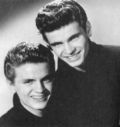| |
|
Who
is Paula C.? ¿Quién es Paula C? Part 2
|
|
| English
y español |
| Part
1: All about Paula How they met |
|
|
| Part
2: "Paula C." Fania Records |
| Part
3: Friends of Papa Egoro |
| Part 4: By Sandra Lafuente P. |
| Part 5: Q&A, Comments |
| Home |
|
All
material
Copyright 2007-2015 MAESTRAVIDA.COM, Alison Weinstock & Paula C- |
| Pictures
are exclusive, and the sole property of P.C. and MAESTRAVIDA.com. Unauthorized copying and public use is NOT ALLOWED under copyright laws. Estas fotos son propiedad exclusiva de P.C y Maestravida.com. Copias no autorizadas y su uso publico es estrictamente prohibido bajo la ley de derechos reservados. |
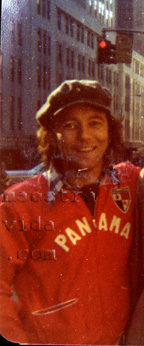 |
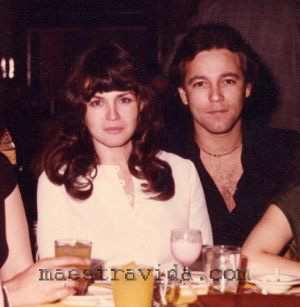
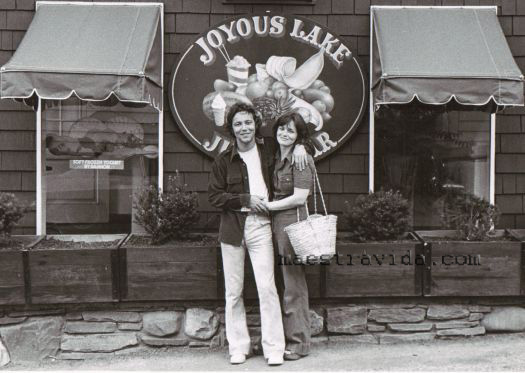 1977 at the
Waldorf
1981 at Joyous Lake
|
||||
| 3. The song... how did it get written, and what was that like for you? | 3. La Canción... ¿Cómo fue escrita, y que significó para ti? | |||
|
The melody for the
song had been around for several years. That wasn't so
unusual. He told me that he was writing a song about me but
never mentioned anything further and I pretty much forgot about
it. When Ruben and I went to Miami to visit his family one
Christmas, his mother Anoland and I went to a local mall. She was
asking me about the melody and I told her I hadn't heard
it. As you know Anoland was a gifted musician and played
the piano and sang beautifully. (She once performed for Queen
Elizabeth and Prince Phillip when they visited Panama.) At this
mall she went into a store that sold pianos and played the
melody. |
(la traducción por Carlos Garcia La melodía ya existía varios años atrás. Lo cual no era muy inusual. El me dijo que escribiría una canción acerca de mí pero nunca mencionó nada más allá y yo lo había olvidado. Cuando Rubén y yo fuimos a Miami en una navidad a visitar a su familia, su madre Anoland y yo fuimos a un pequeño centro comercial local. Ella me preguntaba acerca de la melodía y le dije que nunca la había escuchado. Como sabes Anoland era talentosa para la música, tocaba el piano y cantaba hermosamente. (Una vez tocó para la reina Elizabeth y el príncipe Felipe cuando visitaron Panamá) en ese centro comercial ella entro a una tienda que vendía pianos y toco la melodía. En 1978 estando Rubén de gira por Perú, yo escuchaba una noche un famoso show de salsa en una emisora de radio y anunciaron la nueva canción de Rubén titulada Paula C. incluida en el disco de Louis Ramírez. Para esa época él siempre tocaba sus canciones a guitarra antes de grabarlas. El debe haber mantenido en secreto la realización de esa canción. El nunca me dijo que la había grabado y yo estaba muy sorprendida de ver mi nombre en el título. Yo pensé que él escribiría una canción ambigua pero los hechos fueron basados en la realidad. Para ese tiempo fue difícil para mí. Parecía que llamaba mucho la atención y hacia pública nuestra relación, lo cual como te imaginas, complica las cosas. Rubén siempre se sintió a gusto con su imagen pública pero yo soy una persona más reservada. Las personas me miraban cuando estaba con él y estoy segura que hacían comentarios hacia mí de presumida - pero nunca en mi cara. Algunas veces que viajaba con él, la gente me pedía autógrafos, lo que era muy divertido, pero me complacía que eso no pasara en los Estados Unidos. La mayor parte que vivimos en el mismo barrio donde todos se conocían entre sí, no hubo nunca ninguna algarabía. El barrio estuvo siempre orgulloso de Rubén y de su éxito y pocas veces perfectos extraños tocaban la puerta para pedir hablar con él y recibíamos cartas de fans. ¿Cómo consiguieron la dirección? nunca lo sabré. Hoy - 30 años después la gente del barrio todavía me pregunta como le va a él. Una vez que estuvimos en Panamá para los carnavales - ellos construyeron un toldo llamado Paula C. Un toldo es un salón improvisado usualmente desmontado después de los carnavales. Yo estaba determinada a visitar aquel toldo - Paula C. (Yo sentía que era mi obligación reivindicar mi honor) y después de unas palabras bien sentidas - Rubén me llevó hasta allá. La gente estaba emocionada de tenerlo allá y la pasamos muy bien. También vi una foto de un tanquero de petróleo venezolano llamado Paula C, pero nunca lo vi. Alguien me dijo también que había un caballo de carreras llamado Paula C. He escuchado la versión de Danilo Pérez en su CD - La cual es genial. Con el paso del tiempo - la canción me ha dado una especie de "Gracia" una bendición si se puede. Yo nunca la menciono pero alguien debería saberlo - ellos han sido muy gentiles. Estoy muy agradecida con Rubén por eso. Esta sorprendida de enterarme por medio de Alison que la gente pensaba que yo había muerto (o que era brasilera) y que todavía se preguntan con curiosidad por la canción y la mujer que la inspiró 30 años después. Todo es muy extraño y maravillosamente impresionante. Quizá el hecho más interesante es que yo nunca vi a Rubén interpretar esa canción. Yo no se por que pero todo paso de esa forma. Quizá por que la canción apareció en un disco de Louis Ramírez pero él estaba tocando con Willie Colón. Yo no se. El escribió las letras para mi, la cual todavía conservo. Todavía - todo lo que se dijo - Paula C es mi tono de repique. |
|||
|
|
|||
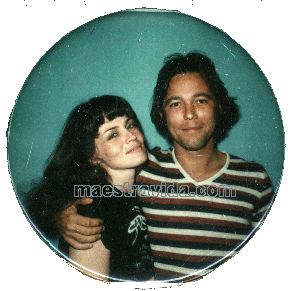 San Gennaro street festival button 1976 |
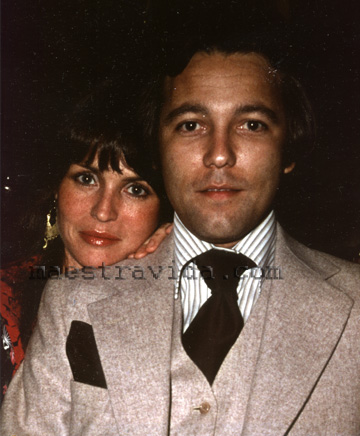 after a concert 1978 |
|||
| 4. Fania - I would love your perspective on what that was like for him, going from the mail room to Barretto and Harlow to stardom, what it was like for the artists working for the company. | 4.
Fania - Me gustaría conocer tu opinión sobre como fue
para él, ir de la oficina de correos hasta el estrellato con la
orquesta de Barretto y Harlow, y como fue para los artistas que
trabajaban en la compañía. |
|||
| I guess if you pull the covers back on any business - it
isn't pretty - but Fania was a real 70's operation as I knew it.
I
didn't know Jerry Masucci very well and frankly I didn't want to know
him. I knew Alex Masucci, his brother, and he was a very funny
person - always made you laugh. By the time Ruben came on the
scene, Fania was the only game in town as Jerry had bought up all of
the smaller labels. It was "record for Fania or don't record." I remember once Willie Colon told me that he spent his teenage years in a recording studio. Then he and Alex drove around to the record stores in his mother's car and sold the albums out of the trunk. In the 1970's there was a group of incredibly talented musicians at Fania, Larry Harlow, Willie, Tito, Hector Cheo, Pete El Conde, Celia, the Palmieri brothers, Raymond and Ismael and so so many gifted bands. Because he had no competition, the deal was Jerry would sign artists to a multi-album contract and pay them a flat fee and no royalties. The only way musicians made enough money to support their families was by touring, and these tours were promoted by Ralph Mercado. When I met Ruben in 1975, he was still in the mailroom and then started to sing with Ray Barretto. He was paid per night - sometimes he worked 3 nights sometimes 2 so we had no money other than what I earned. I remember that Ruben also worked singing with Joe Cuba mostly gigs in New Jersey. He always liked working with Joe who was a true gentleman. Jerry and Fania had everyone over a barrel and controlled everything and when they could, every aspect of people's lives. In some instances they controlled their credit cards and their bills were paid by Fania. If there was a situation Jerry didn't like - he would cut the artist off financially. It was a real "company store" and Jerry Masucci was the Big Daddy. This was how Fania kept the lid on the whole sorry exploitive business. Ruben worked hard and performed a lot to make ends meet. He traveled a lot. He was greatly helped by his singing idol and mentor, Cheo Feliciano and his wonderful wife Coco. They knew the world of salsa and helped Ruben figure out what he needed to do. When Ralph Mercado planned a tour, he would just call Ruben and give him a flat price for the whole gig. That was it. As Ruben got better known, he felt the price was too low so he called Cheo who had performed everywhere in Central and South America. Cheo knew the capacity of all the venues and what the ticket prices generally were - so we could then figure out how much the promoters income could be. Cheo and Coco are very kind and always have treated Ruben like family and supported his career. When we were in Puerto Rico - they always invited us to dinner at their home and one time they drove us around the island and we saw all the beautiful towns. I have great memories from those times and to this day - some 30 years later - the Feliciano's send me a Christmas card. Exceptional people. Because Ruben worked in the mailroom, he had access to more inside information about the company than the other musicians. Jerry's secretary Gert Fredd was a lovely woman from Maine who liked and helped Ruben and saw immediately that he was different. She once told me in an amazed tone that Ruben was handling all the mail correctly - "and he wasn't even familiar with our postal codes!" Ruben would have to push one of those big white mail carts through the streets to the post office every day. At times he got help pushing that huge cart from Gerson Borrero who met Ruben at the lunch counter of Asia de Cuba. Gerson went on to become a very famous journalist and political commentator and currently writes for El Diario La Prensa and has a radio show and appears on New York's Channel One. Gerson has told me he remembers how heavy it was to push that cart through the streets and how when they met in the restaurant - Ruben told him to stuff the free bread in his pockets "for later." After working in the mailroom all day, if he was lucky, Ruben would go to the recording studio and sing backup coro for other artists who were recording at night. When some of Ruben's songs that he had given other artists began to sell well - Jerry treated him differently. Ruben came home one day and announced that Jerry was taking him house hunting in Westchester which is an expensive area north of New York City. I reminded him that this would further indebt him to Fania and that he didn't drive, so he would need a chauffer. Ruben was very careful with his money, the little he had, so the Fania-sponsored house-hunting trip never happened. Eventually he signed a contract with Fania for either 5or 7 albums, but after the huge success of Siembra it was clear Ruben was getting ripped off. At first Jerry told him that the album didn't sell well and after that didn't work - he told him it cost over $150,000 to record in their own studio "after expenses." When Ruben asked what those expenses were the real trouble started. I guess in the past, if Jerry told someone that the album expenses were $150,000 that was the end of it, but now Jerry the lawyer was talking to Ruben the lawyer. Apparently when Jerry signed a new artist he would "suggest" a lawyer to assist them. When these questions about payments were happening with Siembra, I called my neighbor Art, who was an entertainment lawyer to check out Ruben's Fania "suggested" lawyer - it turned out that he had been disbarred. Art suggested Dave Lubell, the lawyer for CBS. So Ruben and I went to see him. He listened to the whole story of Fania and told us that all record companies steal from their artists, but he took on Ruben's case to get his publishing rights back. If I remember, the legal bills were huge - in the hundred of thousands of dollars. But Ruben was determined to do what was right in the hopes of getting his money and also with the hope of helping other Fania musicians. Jerry's money-guy was a Cuban man - Victor Gallo. When the Fania All Stars performed on the road, Victor would go out and buy a new bike - give away the bike and then fill the bike crate with money and then disappear after the show. I actually saw one of these crates filled with cash in Puerto Rico. At the time, Ruben was writing Maestra Vida and performing as much as he could to earn money to pay for his legal bills and build his career. I was so worried about him. Because he had stood up to Fania in a way that no one had (and everyone was watching) Jerry was in a rage at Ruben and threatened that he would never work again and would be "blacked balled" from the entire music business. Jerry had to make sure that everyone stayed in line and Ruben was seen as a threat. Other musicians while sympathetic to Ruben were afraid of Jerry and did nothing to oppose him. Several prominent artists now claim that they stood up to Fania at that time, but I never saw any evidence of that. At this same time, Ruben tried very hard to start a union so everyone could get their fair share of the business. He organized several meetings and paid all the expenses, but the union effort failed to gain support - I would guess out of fear of reprisals from Fania. During this time, Ruben was also dealing with serious immigration problems. When I met him in 1975, he told me he had gotten a deportation order. He decided to go back to Panama and went to the airport to get the plane - but fell asleep and missed the flight so he was in the US illegally. On Sunday Ruben played soccer in Central Park with guys from South America. They introduced him to another player Claude Kleefield who was an immigration lawyer and eventually Claude got Ruben his green card. The strain and pressure of all these problems was crushing and Ruben was physically and emotionally exhausted. Imagine having a relationship with someone under these circumstances - it was a miracle we lasted as long as we did. But I think Ruben and I are tough in a very similar way and we cared deeply for each other - so we struggled on. This past February, Pedro Knight, a trumpeter for Sonora Matancera and Celia Cruz's husband of 41 years had his funeral expenses paid by a Miami businessman because he was broke when he died. This fact speaks volumes as to what Fania really was and how they used their artists. Celia made millions of dollars for Fania and was one of salsa's greatest and most beloved stars. May God bless the heart, soul and life of this kind person who respected the memory of Pedro and Celia and has always chosen to remain anonymous. The current holder of the Fania music catalogue, which was purchased from Jerry Masucci estate, is a division of Virgin Records-(V2)-eMusica. With the new CEO Giora Briel and the work of Bobby Marin, they have enhanced and re-mastered most of the original master tapes which they found molding in a storage locker in upstate New York. The sound is now superior to what it was when the tapes were originally recorded. When eMusica re-mastered Hector Lavoe's El Cantante, I lent them Ruben's original handwritten lyrics, which they used on the packaging. I think the business of Fania was run very similarly to the way slumlords run buildings - you put in very little and take out a whole lot. Those were terribly tough times but in the end Dave Lubell did his job well and Ruben won his case, Claude Kleefield got him his green card and Ruben moved on to even greater success. So, it's very true that it is important to step beyond your fears. "If one advances confidently in the direction of his dreams, and endeavors to live the life which he has imagined, he will meet with a success that is unexpected." Henry David Thoreau "Si uno
avanza con confianza en la dirección de sus sueños, y se
esfuerza por
vivir la vida que se ha imaginado, conocerá un éxito
jamás esperado"
Henry David Thoreau |
Yo creo que si tu buscas en el
fondo de cualquier negocio - no sería bonito - La Fania era una
verdadera compañía en los 70 tal y como la conocí.
Yo no conocí a Jerry Masucci muy bien y francamente no
quería conocerlo. Yo conocí a su hermano Alex, y
él era muy divertido - siempre te hacia reír. Para la
época en que Rubén sale a escena, la Fania era la
única en el juego por que Jerry había comprado a todas
las compañías pequeñas. La regla era o grababas
con Fania o simplemente no grababas. Recuerdo que una vez Willie Colón me dijo que paso su adolescencia en un estudio de grabación. Entonces él y Alex condujeron alrededor del estudio en el carro de su madre y vendieron los álbumes. En los 70 había un increíble grupo de talentosos músicos en la Fania como: Larry Harlow, Willie, Tito, Héctor, Cheo, Pete El Conde, Celia, los hermanos Palmieri, Raymond e Ismael y muchas otras excelentes bandas. Por que no tenían competencia, el trato era que Jerry firmaría contratos multi-album y pagaría una pequeña cuota a los artistas y sin derecho a regalías. La única manera que un músico pudiera hacer dinero suficiente para mantener a sus familias era con las giras, y esas giras eran promovidas por Ralph Mercado. Cuando yo conocí a Rubén en 1975, todavía estaba en el correo y luego comenzaría a cantar con Ray Barretto. Se le pagaba por noche - algunas veces trabajaba 3 noches otras, 2 noches debido a que no teníamos mas dinero que el que yo ganaba. Recuerdo que Rubén también cantó con Joe Cuba mayormente presentaciones en New Jersey. A él también le gustaba trabajar con Joe quien era todo un caballero. Jerry y Fania tenían a todos controlados como en un barril cuando lo querían, y en cada aspecto de sus vidas. En muchas instancias controlaron sus tarjetas de crédito y sus cuentas eran pagadas por Fania. Si había una situación que a Jerry no le gustaba - el cortaba financieramente al artista. Era realmente como una botica y Jerry Masucci era el amo. Así fue como Fania se mantuvo como el líder de todo el lamentable negocio de explotación. Rubén trabajaba muy duro y tocaba bastante para hacer dinero. Viajó mucho. Fue apoyado muchísimo por su ídolo y mentor, Cheo Feliciano y su maravillosa esposa Coco. Ellos conocían el mundo de la música de Salsa y lo ayudaron para que entendiera lo que debía hacer. En una gira que organizó Ralph Mercado, llamo a Rubén y le ofreció un precio muy bajo por todos los espectáculos. Así fue que. Rubén ya gozando de cierta fama, sentía que el precio era demasiado bajo y decidió llamar a Cheo quien ya había tocado en centro y sur América. Cheo conocía la capacidad de todas las sedes y el costo de los tickets - así que podían calcular cuanto podrían ser los ingresos. Cheo y Coco son muy gentiles y siempre han tratado a Rubén como de su familia y han apoyado su carrera. Cuando íbamos a Puerto Rico - ellos siempre nos invitaban a cenar en su casa y una vez nos llevaron a recorrer la isla y vimos todos los bellos lugares de la ciudad. Tengo bellas memorias de esos días - 30 años después - La familia Feliciano me envía una tarjeta de navidad. Que gente tan excepcional. Debido a su trabajo en el correo, Rubén tenía acceso a mucha más información interna acerca de la compañía y de sus músicos. La secretaria de Jerry, Gert Fredd era una dulce dama de Maine quien gustaba de Rubén y lo ayudaba y vio inmediatamente que él era diferente. Ella una vez me dijo con tono de asombro que Rubén estaba conduciendo el corre de forma genial - "y eso que no esta familiarizado con nuestros códigos postales" Rubén tenía que cruzar las calles de la ciudad todos los días empujando esas carretillas gigantes hasta la oficina postal. En ese entonces lo ayudaba a empujar esas carretillas Gerson Borrero a quien conoció en una cantina. Gerson se convertiría en un famoso periodista y comentarista político y actualmente escribe para El Diario La Prensa y tiene un show radial y aparece en el canal uno de Nueva York. Gerson me ha dicho que recuerda cuan pesado era empujar aquellas carretillas por las calles y como fue cuando se conocieron en aquel restaurante - Rubén le dijo que guardara el pan gratuito en sus bolsillos "para después" Luego de trabajar todo el día en el correo, y si tenía suerte, se iba al estudio para hacer coros para los otros artistas que grababan durante la noche. Cuando alguna de las canciones escritas por Rubén comenzaba a ser bien vendida - Jerry lo trataba de forma diferente. Rubén vino a casa un día y me dijo que Jerry lo llevaría a su casa de Westchester la cual es una zona exclusiva del área norte de Nueva York. Yo le recordé que eso podría convertirse en una deuda futura para él con Fania con la cual no podría. Rubén fue muy cuidadoso con su dinero, lo poco que tenia, el viaje nunca se dio. Eventualmente firmo un contrato por 5 o 7 álbumes, pero después del inmenso éxito de Siembra era claro que Rubén lo rompería. Antes de que Jerry le dijera que el álbum no se había vendido bien o que no funciono - Jerry le dijo que le había costado cerca de 150.000 dólares grabar el disco en su estudio "con todo y gastos" y cuando Rubén le pregunto que eran esos gastos fue que comenzó el gran problema. Yo supongo que en el pasado, si Jerry le decía a alguien que los gastos de grabación eran 150.000 dólares allí quedaba la cosa. Pero ahora Jerry el abogado estaba hablando con Rubén el abogado. Aparentemente cuando Jerry firmaba a un Nuevo artista él le recomendaba a un abogado para que lo asesorara. Cuando esas preguntas sobre los gastos de Siembra aparecieron, yo llame a mi vecino Art, quien era un abogado en entrenamiento para que chequeara al abogado de Rubén sugerido por Fania - y resulto que el mismo había sido expulsado. Art nos recomendó a Dave Lubell, el abogado por CBS. Así que Rubén y yo fuimos a verlo. El escuchó la historia completa de Fania y nos dijo que todas las compañías disqueras les robaban a sus artistas, pero tomó el caso de Rubén para devolverle sus derechos de publicidad. Si mal no recuerdo los honorarios legales eran altísimos - en el orden de los cientos de miles de dólares. Pero Rubén estaba determinado a hacer lo que fuera necesario con la esperanza de recuperar su dinero y de ayudar a otros músicos de Fania. Víctor Gallo, un cubano era el encargado de las finanzas de Jerry cuando la Fania estaba de gira, Víctor salía a comprar una bicicleta nueva y se la entregaba a alguien, luego llenaba la funda con el dinero recabado y desaparecía con él al terminar el show. Yo misma vi uno de esas fundas llenas de dinero en Puerto Rico. Para la época Rubén estaba escribiendo Maestra Vida y tocando tanto como podía para ganar dinero y pagar sus cuentas producto del conflicto legal además de continuar con su carrera. Me preocupaba mucho por él. Por que se había enfrentado a Fania de una forma que nadie lo había hecho antes (y que nadie había visto) Jerry le tenía rabia a Rubén y trataba de que no volviera a trabajar de nuevo y que fuera apartado de todo el negocio de la música. Jerry tenía que asegurarse de que todo el mundo se mantuviera a raya y que Rubén fuera visto como un peligro. Otros músicos que simpatizaban con la causa de Rubén le tenían miedo a Jerry y no hicieron nada para enfrentarlo. Muchos ahora declaran haberse opuesto a Fania en ese momento. Pero no hay evidencia de nada de eso. Al mismo tiempo Rubén trataba de comenzar una alianza de forma que cada uno pudiera obtener una participación justa en el negocio, él organizó varias reuniones y cubrió todos los gastos, pero sus esfuerzos no dieron frutos - supongo que por temor a represalias por parte de Fania. Durante ese tiempo Rubén también lidiaba con serios problemas de inmigración. Cuando lo conocí en 1975, el me dijo que tenía una orden de deportación. Decidió regresar a Panamá y fue al aeropuerto a tomar el avión - pero se quedo dormido y perdió el vuelo así que estaba ilegalmente en Estados Unidos. El domingo jugo fútbol en el Central Park con unos chicos de sur América. Ellos le presentaron a otro jugador Claude Kleefield quien era un abogado de inmigración y así consiguió una visa provisional. El desgaste y la presión por todos esos problemas fueron haciendo mella en Rubén que estaba física y emocionalmente exhausto. Imagina tener una relación con alguien bajo semejantes circunstancias - fue un milagro que duráramos tanto. Pero pienso que estábamos educados de forma muy similar y nos cuidábamos mutuamente - así que lo soportamos. El pasado febrero, los gastos funerales de Pedro Knight, trompetista de la Sonora Matancera y esposo por 41 años de Celia Cruz, fueron pagados por un empresario de Miami por que cuando Pedro murió estaba arruinado. Ese hecho te da una idea de lo que era Fania y de cómo uso a sus artistas. Celia produjo millones de dólares para Fania y fue una de las estrellas más grandes y amadas de la salsa. Dios bendiga el corazón, el alma y la vida de esas generosas personas que respetaron la memoria de Pedro y Celia, y que han elegido permanecer anónimos. El actual gerente del catalogo de Fania music, el cual fue comprado a Jerry Masucci estate, es una división de Virgin Records-(V2)-eMusica. Con el nuevo CEO Giora Briel y el trabajo de Bobby Marin, ellos han ampliado y re-masterizado la mayoría de las cintas originales que fueron encontradas en Nueva York. El sonido es superior a como era originalmente. Cuando eMusica re-masterizo El Cantante de Héctor Lavoe, yo les preste los escritos originales de Rubén, los cuales fueron usados en el empaque del CD. Yo creo que el negocio de Fania fue conducido de la misma forma como un avaro gerencia un edificio de condominios - comienza de la nada y lo va engordando a costa de otros. Esos fueron unos terribles días pero al final Dave Lubell hizo su trabajo y Rubén gano su caso, Claude Kleefield le dio su visa y Rubén se mudo a un éxito aun mayor. Así que, de verdad es importante ver más allá de los temores. |
|||
Paula C lyrics/letras
Rubén Blades & his
Cast of Characters
Danilo Perez plays it

Live in Puerto Rico 1994
HOME:
maestravida.com
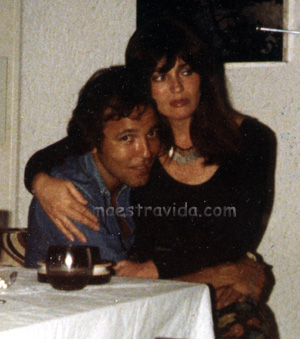
 Panama
1979
Rio 1980
|
|
 Blades
también hace campaña por Obama - CARTAGENA,
ESPAÑA - 27/07/2008
Sorpresas de la vida Blades aprovechó para improvisar en su conocido estribillo: "La vida te da sorpresas, sorpresas te da la vida y en Estados Unidos viene un presidente negro", recibido con alborozo por el público presente. En la recta final sonaron Patria y Plantación adentro, que cerraron una intensa actuación de más de dos horas de duración. |
Agradecemos a Paula su gran generosidad, cordialidad y buen humor; y por todo el tiempo y esfuerzo que nos dedicó durante la entrevista. Estamos especialmente agradecidos por su interés y apoyo a maestravida.com.
COPYRIGHT 2007-2015 MAESTRAVIDA.COM, Alison Weinstock, & Paula C-
Reprinted with our permission at these sites: salsacentralglobal.com, lasalsavive.org (translated into Italian)
